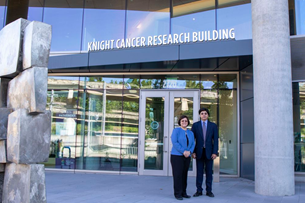Developing new effective treatments for cancer patients

The center unites cutting-edge technologies with a multidisciplinary group of clinicians and scientists to advance drug discovery and development. OHSU is one of the few universities nationally to bring together the infrastructure to translate scientific discoveries from the lab into effective therapies for human diseases. Learn more about the center
Drug discovery and development for a range of diseases

- Cancer: solid tumors and hematological malignancies
- Drugs to treat cardiovascular diseases
- Anti-infective agents
- Drugs to treat neurologic disorders
- Radiation sensitizers and protectors
- Stem cells
- Learn more about our work
Join us for virtual talks with experts in the field

Our lecture series spotlights researchers engaged in discovering and validating therapeutic targets, biomarkers, developing novel agents and conducting clinical research. These events are free and open to the public.
Recent news

The OHSU Knight Cancer Institute’s Center for Experimental Therapeutics has been selected as the only cancer center in the Pacific Northwest to participate in a national consortium aimed at accelerating the discovery and development of new and innovative targeted cancer therapies.
Androgen deprivation therapies for prostate cancer inevitably fail, and most patients progress to metastatic and incurable castration-resistant disease. In Cell Reports Medicine, Sanjay Malhotra, Ph.D., and colleagues describe a potential new therapy for prostate cancer that acts through a mechanism independent of androgen signaling.
